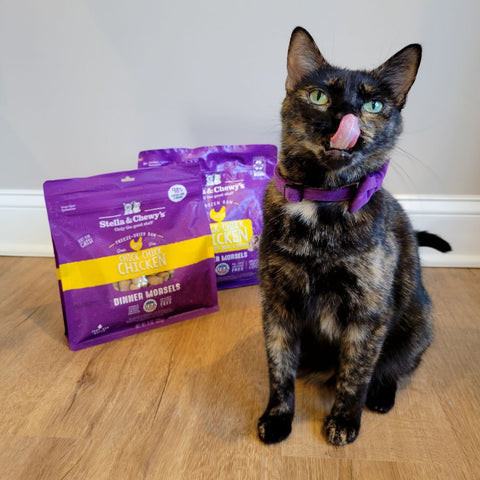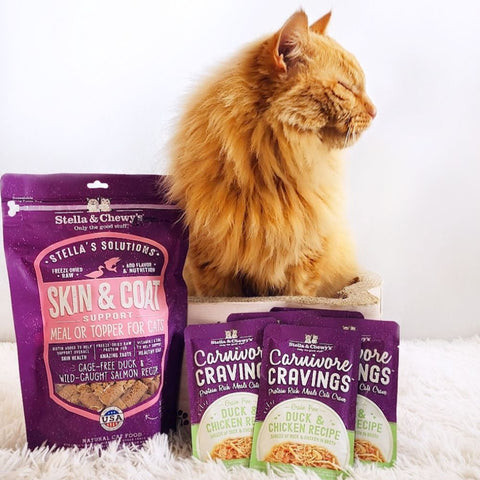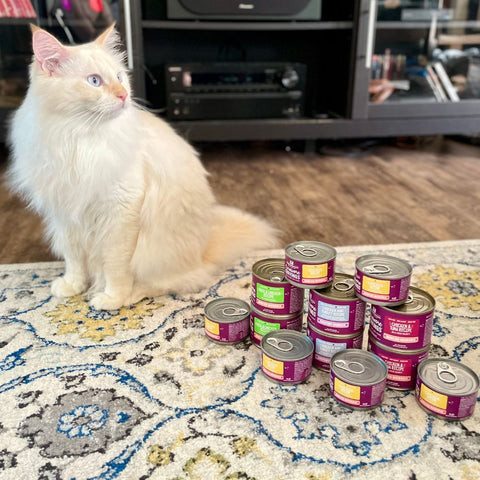Eggs are a staple in many human diets, packed with protein and essential nutrients. If you’re a cat owner, you might have wondered, “Can Cats Eat Boiled Eggs?” The short answer is yes, cats can eat boiled eggs, and they can be a healthy and beneficial treat when prepared correctly and served in moderation.
Eggs offer a wealth of nutritional benefits for cats, making them a potentially valuable addition to their diet as an occasional treat. However, it’s crucial to understand the do’s and don’ts of feeding eggs to your feline friend to ensure their safety and well-being. This comprehensive guide will delve into everything you need to know about incorporating boiled eggs into your cat’s diet, from nutritional advantages to potential risks and proper serving methods.
Nutritional Benefits of Eggs for Cats
Cooked eggs are a nutritional powerhouse, offering a range of vitamins and minerals that contribute to your cat’s overall health. For healthy cats, boiled eggs can be a beneficial supplement to their regular diet, providing them with:
- High-Quality Protein: Eggs are an excellent source of protein, which is crucial for muscle development and repair, immune function, and hormone production in cats. Protein from eggs is highly digestible and contains all the essential amino acids that cats need.
- Essential Vitamins and Minerals: Eggs are rich in various vitamins and minerals, including:
- Vitamin D: Essential for calcium absorption, bone health, and immune function. While cats primarily get Vitamin D from sunlight and their food, eggs can offer a dietary boost.
- Vitamin B12: Plays a vital role in nerve function, DNA synthesis, and red blood cell formation.
- Vitamin A: Important for vision, immune function, and cell growth.
- Riboflavin (Vitamin B2): Supports energy production and healthy skin and coat.
- Folate (Vitamin B9): Necessary for cell growth and division.
- Iron: Essential for carrying oxygen in the blood and preventing anemia.
- Selenium: An antioxidant that protects cells from damage and supports thyroid function.
- Lutein and Zeaxanthin: These antioxidants are beneficial for eye health and can help protect against age-related macular degeneration.
- Omega-3 Fatty Acids: Egg yolks contain omega-3 fatty acids, which are known for their anti-inflammatory properties and can contribute to a healthy and shiny coat.
While eggs offer these nutritional advantages, it’s important to remember that they should not be the primary source of nutrition for your cat. A balanced cat food diet is formulated to meet all their daily nutritional needs. Boiled eggs should be considered a supplemental treat.
 tortoiseshell-cat-licking-lips_480x480
tortoiseshell-cat-licking-lips_480x480
Egg Whites vs. Egg Yolks: What’s Best for Cats?
When considering feeding boiled eggs to your cat, understanding the difference between egg whites and yolks is important:
Egg Whites
- Protein Powerhouse: Egg whites are primarily composed of protein and water, with very little fat or cholesterol. They can be a lean source of protein for your cat.
- Avidin Concerns in Raw Egg Whites: Raw egg whites contain a protein called avidin, which can bind to biotin (vitamin B7) and prevent its absorption. Biotin deficiency is rare in cats fed a balanced diet, but it’s still a potential risk with regular consumption of raw egg whites. Cooking eggs deactivates avidin, making cooked egg whites safe.
- Not a Primary Protein Source: While egg whites offer protein, they should not replace the protein your cat gets from their main diet.
Egg Yolks
- Nutrient-Dense and Flavorful: Egg yolks are packed with nutrients, including fat-soluble vitamins (A, D, E, K), essential fatty acids, and cholesterol. They also contribute to the rich flavor that many cats find appealing.
- Higher Fat Content: Egg yolks are significantly higher in fat and calories compared to egg whites. While some fat is essential for cats, excessive fat intake can lead to weight gain, especially in less active or overweight cats. One large egg yolk contains around 55 calories, primarily from fat.
- Moderation is Key: Due to their higher fat content, egg yolks should be given in moderation, especially if your cat is on a weight management diet.
For a healthy treat, you can offer your cat both the white and yolk of a boiled egg, keeping portion sizes small and considering their overall calorie intake. If you are concerned about fat content, you can offer egg whites more frequently and yolks less often.
Safe Ways to Prepare Boiled Eggs for Cats
Safety is paramount when preparing eggs for your feline companion. Always ensure eggs are fully cooked before offering them to your cat. Here are safe cooking methods:
- Boiled Eggs: Boiling eggs is a simple and healthy way to prepare them for cats.
- Place eggs in a saucepan and cover with cold water.
- Bring water to a rolling boil.
- Remove from heat, cover, and let stand for 10-12 minutes for hard-boiled eggs.
- Cool completely before peeling and serving.
- Scrambled Eggs (Plain): Scrambled eggs are another palatable option. Cook them thoroughly in a pan with no oil, butter, or seasonings.
- Poached Eggs (Plain): Poaching is a gentle cooking method that doesn’t require added fats. Poach eggs in simmering water until the whites are set and yolks are cooked to your preference (ensure yolk is also cooked for cats).
- Microwaved Eggs (Plain): You can microwave eggs, but ensure they are fully cooked and not rubbery. Use a microwave-safe dish and cook in short intervals, checking for doneness.
Important Don’ts When Preparing Eggs for Cats:
- No Raw Eggs: Never feed raw eggs to cats due to the risk of Salmonella and E. coli bacteria, which can cause food poisoning in both cats and humans. Raw egg whites also contain avidin, which can interfere with biotin absorption.
- Avoid Seasonings: Do not add any salt, pepper, spices, or other seasonings to eggs intended for your cat. Salt toxicity is a concern in cats, and other seasonings can be harmful or upset their digestive system.
- No Added Fats: Avoid cooking eggs with butter, oil, or milk if you are giving them to your cat, especially if you are mindful of their weight.
Once cooked, let the egg cool down to a safe temperature before offering it to your cat. Cut it into small, manageable pieces or mash it for easier consumption, especially for kittens or senior cats.
Portion Control: How Much Boiled Egg Can Cats Eat?
Moderation is key when offering boiled eggs to your cat. Eggs should be considered a treat and not a significant part of their daily calorie intake.
- The 10% Treat Rule: Treats, including boiled eggs, should ideally make up no more than 10% of your cat’s daily calorie intake. The majority of their calories should come from a complete and balanced cat food.
- Calorie Considerations: One large chicken egg contains approximately 75 calories. An average 9-pound cat needs around 280 calories per day. Overfeeding treats, even healthy ones like eggs, can contribute to weight gain.
- Serving Size Guideline: A general guideline is to offer no more than one tablespoon of cooked egg as a treat or meal topper, and limit this to once or twice a week.
- Adjust for Your Cat: The appropriate portion size will vary based on your cat’s size, age, activity level, and overall diet. Smaller cats and kittens will need smaller portions.
Observe your cat’s weight and adjust treat portions accordingly. If your cat starts gaining weight, reduce the amount of treats you are giving them.
 orange-cat-blinking_480x480
orange-cat-blinking_480x480
Can Kittens Eat Boiled Eggs?
Yes, kittens can also enjoy boiled eggs as a treat, provided they are properly cooked and served in small, kitten-appropriate portions.
- Nutritional Benefits for Kittens: The protein and nutrients in eggs can be beneficial for growing kittens, supporting their development.
- Portion Control is Crucial for Kittens: Kittens have smaller stomachs and require carefully balanced nutrition for growth. Treats should be an even smaller part of their diet compared to adult cats.
- Start with Very Small Amounts: Introduce boiled egg to kittens in very small amounts (e.g., half a teaspoon) to see how they tolerate it.
- Focus on Kitten Food: Ensure kittens are primarily getting their nutrition from a high-quality kitten food formulated to meet their specific growth needs. Boiled eggs should only be occasional, small treats.
Potential Risks of Feeding Eggs to Cats
While boiled eggs can be a healthy treat, it’s essential to be aware of potential risks:
Egg Allergies in Cats
- Allergies are Possible: Although not as common as in some other species, cats can be allergic to eggs.
- Signs of Allergies: If you are introducing eggs to your cat for the first time, watch for signs of food allergies, such as:
- Digestive upset (vomiting, diarrhea)
- Itching, scratching, or skin irritation
- Excessive grooming
- Hair loss
- Introduce Eggs Gradually: Feed a very small amount of cooked egg initially and monitor your cat for any adverse reactions before offering more.
Risks of Raw Eggs
- Bacterial Contamination: Raw eggs can harbor harmful bacteria like Salmonella and E. coli, leading to food poisoning in cats. Symptoms can include vomiting, diarrhea, fever, lethargy, and loss of appetite.
- Avidin and Biotin Deficiency: As mentioned earlier, raw egg whites contain avidin, which can interfere with biotin absorption over time.
Overfeeding Treats
- Nutritional Imbalance: If eggs or other treats become a significant portion of your cat’s diet, they may eat less of their balanced cat food, leading to nutritional deficiencies.
- Weight Gain and Obesity: Eggs, especially yolks, are calorie-dense. Overfeeding can contribute to weight gain and obesity, increasing the risk of various health problems like diabetes, arthritis, and heart disease.
Boiled Eggs as a Treat, Not a Meal Replacement
While boiled eggs offer nutritional benefits, they are not a complete and balanced food source for cats. Eggs should be given as an occasional treat and not as a meal replacement.
- Complete Cat Food is Essential: High-quality commercial cat foods are formulated to provide all the essential nutrients cats need in the correct ratios, including protein, fats, carbohydrates, vitamins, and minerals.
- Eggs Lack Essential Nutrients: Eggs do not contain all the nutrients required for feline health in the right proportions. Relying on eggs as a primary food source would lead to nutritional deficiencies over time.
- Variety of Healthy Treats: If you are looking for healthy treat options for your cat, consider commercially available cat treats, small pieces of cooked lean meat (chicken, fish), or even certain cat-safe fruits and vegetables in moderation.
Stella & Chewy’s offers a variety of healthy cat food options, including recipes that incorporate dried egg in a balanced way, such as our Carnivore Cravings Purrfect Paté recipes. These can be a convenient way to include egg in your cat’s diet within a complete and balanced meal.
 white-cat-with-wet-cat-food_480x480
white-cat-with-wet-cat-food_480x480
Conclusion: Boiled Eggs Can Be a Healthy Treat for Cats in Moderation
In conclusion, boiled eggs can be a healthy and nutritious treat for cats when prepared safely and given in moderation. They offer high-quality protein, essential vitamins and minerals, and beneficial antioxidants. However, they should not replace a balanced cat food diet and should be given as an occasional treat, not a meal replacement.
Always cook eggs thoroughly, avoid seasonings, and offer them in small, appropriate portions. Monitor your cat for any signs of allergies or digestive upset when introducing eggs. By following these guidelines, you can safely share the occasional boiled egg with your feline friend as a tasty and healthy treat.
